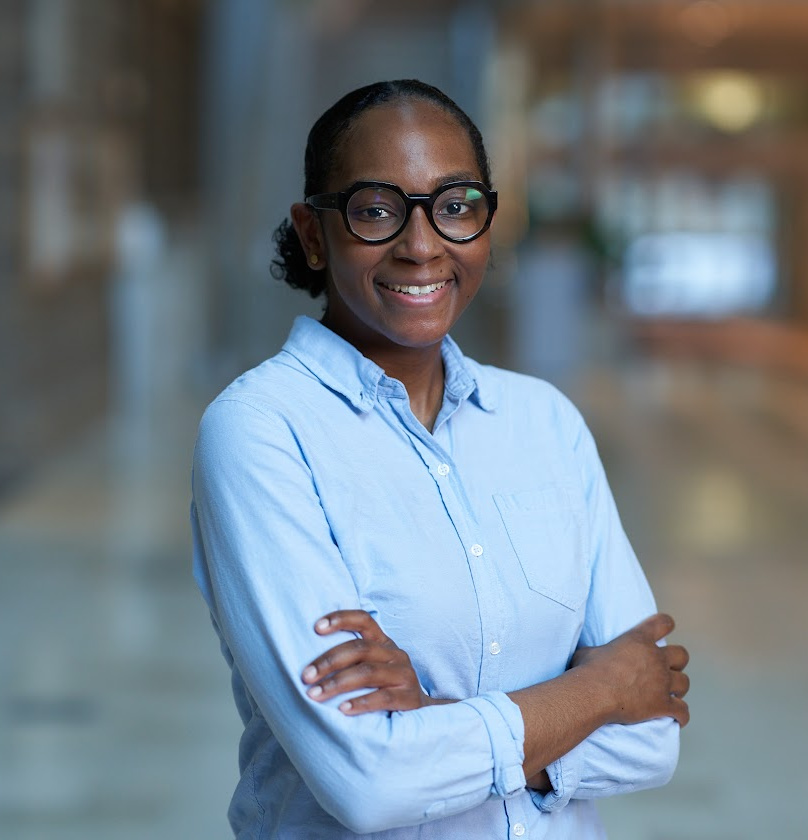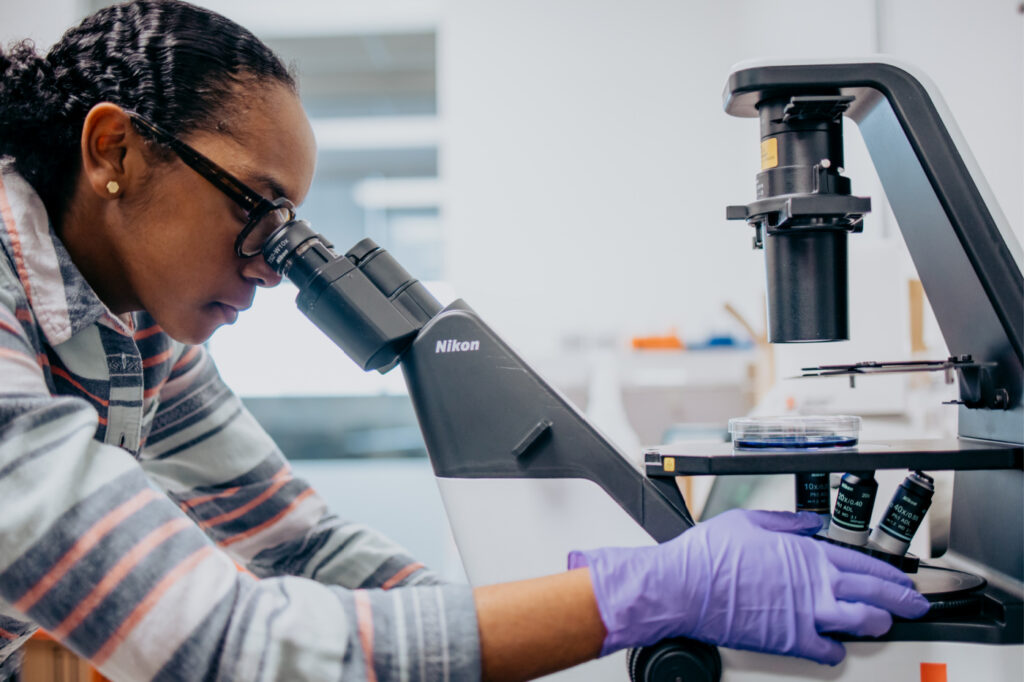
This year’s recipient for the Society for Neuroscience’s Pre/Postdoctoral Next Generation Award is Sabin Nettles, a graduate student in the lab of Harrison Gabel, PhD, assistant professor in the Department of Neuroscience at Washington University School of Medicine. The honor recognizes the outstanding efforts of individuals who have introduced neuroscience to young students through outreach or communication efforts.
Nettles leads the Brain Discovery initiative, which brings scientists from Washington University into local fourth- to sixth-grade classrooms for a six-week hands-on course in neuroscience. “She’s really engaging the St. Louis community,” says Gabel. “They’re spectacular programs that offer a chance to show kids that neuroscience and research and medicine are things you can do even in an environment where there isn’t a lot of exposure.”
Nettles is also the coordinator for St. Louis Neuroscience Outreach, a hub for activities to engage the public with science. All this while advancing her dissertation research on the interactions among proteins involved in Rett Syndrome, a rare genetic disorder.
“Communicating science has become one of my passions,” says Nettles, who plans to bring her dedication for education and outreach into her research career.
Nettles’s passion has had a profound influence on the culture of the Gabel lab. Inspired by Nettles’s dedication to volunteering, Gabel implemented an outreach component to his graduate students’ training. “She’s brought a social consciousness to the lab,” he says.
No science answers? No sweat
Nettles’s interest in science began in sixth grade, after her family moved to Nashville, Tennessee from Ann Arbor, Michigan. Her class was learning about Mars rovers, and Nettles had questions about the robots and experiments and Martian environment, but her teacher couldn’t answer them. She decided to take matters into her own hands and assemble the first Science Olympiad team at her school so she could learn how to answer them herself.
At the competition that year, Nettles’s team was conspicuously different—they wore the uniforms of their all-girls school, while most of the other teams, composed primarily of boys, donned white lab coats. “We were the only all-girls school involved in this in middle Tennessee,” says Nettles. They built a robot that could navigate a maze and complete tasks, engineered a device to compete in an Egg Drop competition, completed an exam identifying rocks and minerals and ultimately scored among the top competitors. “It was the first time I participated in this type of activity—working with my peers to problem-solve in real time, coming up with ideas and alternative approaches for the ideas when they failed. I found out that this is the stuff I like to do.”
To this day, I really enjoy studying the various ways proteins dictate cellular function and activity.
Sabin Nettles
In high school, Nettles’s mother, Arie Nettles, PhD, professor of clinical pediatrics at Vanderbilt University Medical Center, suggested her daughter seek out a laboratory research experience. Nettles contacted Louis Muglia, MD, PhD, who studies the molecular mechanisms of preterm birth, to see if she could spend a summer in his lab at Vanderbilt. (Muglia, now the CEO of the Burroughs Wellcome Fund and affiliated with Cincinnati Children’s, was a faculty member at Washington University School of Medicine from 1996 to 2008.) Nettles ended up spending two summers in his lab, investigating the effects of stress on learning and memory in mice. During her time in the lab, she learned histology, genotyping and dissections. The work led to her first publication, in the Journal of Neuroscience in 2010, illustrating how altered levels of corticotropin-releasing hormone, such as those observed during early-life stress, affect the behaviors of mice in adulthood.
“The lab members were very encouraging and supportive of me getting involved,” Nettles says. “As a young scientist it left an indelible impression.”
Clinical perspectives in basic research
Through her undergraduate course work, Nettles developed an interest in understanding the biology underlying disease. Nettles contacted Annette Kim, MD, PhD, at Vanderbilt University Medical Center, who studies the roles of microRNAs in hematopoiesis, the differentiation of stem cells into blood cells, and how aberrant hematopoiesis gives rise to myelodysplastic syndromes (MDS). (Kim is now associate professor of pathology at Harvard Medical School and Brigham and Women’s Hospital). Nettles spent a summer working in Kim’s lab investigating the knock-down of a specific microRNA in cell culture to determine how this alters the expression of genes critical for myeloid cell fate and maturation. During this summer experience, Nettles had the opportunity to conduct disease-related basic science research in the lab, while also shadowing Dr. Kim in the clinic.
This experience uniquely allowed Nettles to work independently on a research project, which ignited her interest in genetic mechanisms underlying cellular development, but also inspired her to participate in initiatives that bridge the gap between basic science research and clinical medicine.
As a graduate student, Nettles is a recipient of the Lucille P. Markey Special Emphasis Pathway in Human Pathobiology Fellowship, which provides WashU PhD students the opportunity to supplement their dissertation research with a clinical research experience. Through participation in the Markey Special Emphasis Pathway, Nettles engaged in coursework focused on the neurobiology and pathogenesis of disease and acquired first-hand exposure to clinical medicine through the clinical mentorship. Participation in this pathway provided Nettles with a unique perspective toward approaching her research by engaging with physician-scientists and discussing the current overarching questions in the field, current gaps in our knowledge and future research directions.

A biochemist emerges
Growing up, Nettles was strongly influenced by her older sister—“She was president of the student council, I was president of the student council. She did soccer, I did soccer,” she says—and following her sister’s lead, Nettles decided to go to college on the east coast.
She chose Boston College, although she continued to spend summers doing research projects at Vanderbilt. After she graduated, she spent two years as a research associate in the lab of Marc Tetel, PhD, the Dorothy and Charles Jenkins, Jr. Distinguished Professor of Neuroscience at Wellesley College, studying steroid hormone receptors. Nettles contributed to multiple publications, including a study published in eNeuro that identified novel protein interactors that are recruited to progestin receptors in the mouse hypothalamus and alter energy metabolism and synaptic remodeling and a study published in the Journal of Neuroendocrinology investigating a novel mechanism for the ligand-independent activation of progestin receptors by the neurotransmitter dopamine. “It was my first-time doing biochemistry,” Nettles recalls, “and to this day I really enjoy studying the various ways proteins dictate cellular function and activity.”
When it came time to selecting a graduate school, Washington University appealed for two primary reasons: 1) her sister was enrolled in law school at WashU, and 2) numerous labs were doing basic research investigating the molecular mechanisms underlying neurodevelopment and how disruption of these regulatory networks gives rise to developmental disorders such as autism. In her first year, she rotated through several labs before her final stint, with Gabel’s lab, which had just opened its doors the year before.
Being in the first cohort of graduate students advised by Gabel, Nettles and her labmates formed close bonds. “We had a lot of fun talking about experiments. Then we’d put them before Harrison and he’d say, ‘sure, if you have time, go for it.’ It made science so fun,” she says. The broader environment at the school of medicine and St. Louis was also an enriching and welcoming place. “People smile here. It’s a very collaborative environment.” she says.
She’s brought a social consciousness to the lab.
Harrison Gabel, PhD
Nettles’s dissertation work has focused on addressing the question: why are the longest genes in the genome expressed in the brain? Nettles is interrogating this unique gene expression signature that is necessary for proper neuronal development and the transcriptional machinery that regulates the expression of these genes. Through these studies, she has been able to incorporate experiments that allow her to study protein-protein interactions and model disease.
In her second year of graduate school, Nettles volunteered with Brain Discovery as an instructor. The hypothesis-driven curriculum includes brain anatomy—kids can touch and examine a real human specimen—cell biology and physiology. One of the main motivators for her involvement is that year after year, there was less diversity among her teachers. Since entering college, she’s had only handful of STEM professors who were women and no teachers of color.
“Not having anybody who looks like you can be intimidating and in some cases a major deterrent,” says Nettles. “I wanted to go into St. Louis public schools and say, ‘I’m a neuroscientist.’ Diversity among clinicians has gotten far better in recent years. In the PhD realm and basic science labs, we’re far, far from where I think we should be.”
Nettles is wrapping up her thesis in the coming months and preparing to do a postdoctoral fellowship next. “I love academia because you can teach,” she says. “One of the biggest things for me is being able to provide for the next generation of students.”
Sabin Nettles
Graduate student, Washington University School of Medicine
Advisor: Harrison Gabel, PhD
Expertise: Gene-regulatory mechanisms underlying neuronal development
Favorite St. Louis spot: Pappy’s BBQ
WashU highlight: Annual Neuroscience Retreat